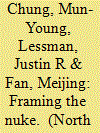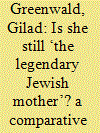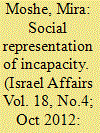|
|
|
Sort Order |
|
|
|
Items / Page
|
|
|
|
|
|
|
| Srl | Item |
| 1 |
ID:
130548


|
|
|
|
|
| Publication |
2014.
|
| Summary/Abstract |
Purpose-This cross-national study examines differences in news coverage of North Korea's first 2006 nuclear test in newspapers from the countries involved in the six-party talks with North Korea.
Design/methodology/approach-This population study is based on a quantitative content analysis of 564 newspaper articles from the highest-circulation native-language daily newspapers in countries involved in the six-party talks: the United States, China, South Korea, Japan, and Russia.
Findings-The framing analysis provides the significant differences of the news coverage: the U.S. newspaper demonstrated the strongest war journalism framing, the Chinese newspaper the unanimous peace journalism framing, the Japanese and Russian newspapers strong peace journalism framings, and the South Korean newspaper the strongest neutral framing.
Practical implications-This study found that the highest circulated newspapers of the countries involved in the six-party talks used different frames covering North Korea's first nuclear weapons test.
|
|
|
|
|
|
|
|
|
|
|
|
|
|
|
|
| 2 |
ID:
164322


|
|
|
|
|
| Summary/Abstract |
In an attempt to demonstrate how historical changes in public opinion concerning women in politics might be reflected in the media, this article offers an examination of Golda Meir’s 1969 election campaign coverage in the Israeli press compared to Tzipi Livni’s in 2009. Through a gender-focused content analysis of 878 news items, we show how, despite the scholarly argument regarding a ‘gender-blind’ socio-historical attitude towards Meir, the Israeli media discourse did in fact strongly emphasise gender-oriented elements while covering her 1969 candidacy. However, the historical comparison also shows that, with the passage of time, the Israeli press was significantly affected by political personalisation trends, as well as by a growing influence of more conservative voices, and as a result became far more gender-centred and stereotypical in Livni’s case.
|
|
|
|
|
|
|
|
|
|
|
|
|
|
|
|
| 3 |
ID:
190062


|
|
|
|
|
| Summary/Abstract |
This article evaluates the presence of framing mechanisms in Dutch media reporting on the Second Karabakh war. The paper is led by the following questions: To what extent, and why, does the reporting of the Dutch press favour/undermine certain actors in the conflict? What kind of framing patterns are involved in generating such partiality? And did the frames change over the course of the war? In order to evaluate the presence of framing mechanisms in Dutch media reporting on the second Karabakh war, this research conducted a qualitative data analysis of 188 articles on the topic in nine major national Dutch news media. The paper finds that Dutch newspapers created a rather stereotypical, simplified picture of the Second Karabakh war. There are instances where the reporting gave the impression of a possible bias or overemphasis on certain dimensions.
|
|
|
|
|
|
|
|
|
|
|
|
|
|
|
|
| 4 |
ID:
116188


|
|
|
|
|
| Publication |
2012.
|
| Summary/Abstract |
This article deals with the social representation of incapacity in Israeli political culture by applying CDA (critical discourse analysis) to two outstanding cases of incapacity: permanent incapacity in the case of Prime Minister Ariel Sharon as a result of illness and temporary incapacity in the case of President Moshe Katzav, following a police investigation. A social representation of incapacity in leading figures as seen in the headlines of Ha'aretz (an elite Israeli newspaper) was analysed, with the following results: a) in the case of Prime Minister Sharon, he is a warrior battling for his life, while his successors battle for governmental control and stability; b) in the case of President Katzav, he veers between attacker and attacked. The psycho-social analysis of the political-cultural scene indicates that these social representations provide a mechanism for maintaining stability and cushioning shocks while also disseminating a pronounced sense of confusion.
|
|
|
|
|
|
|
|
|
|
|
|
|
|
|
|
| 5 |
ID:
094699


|
|
|
|
|
| Publication |
2010.
|
| Summary/Abstract |
This study analyzes the impact of media framing on aggregate attitudes and expectations of Israelis toward the Oslo peace process with the Palestinians during a time period of eight years (1995-2003). It presents three main contributions: First, it provides a long-term analysis of the impact of media coverage of a peace process on public opinion, while controlling for the influence of real life events. Second, it presents empirical evidence that the strength of media framing effects varies among different facets of public opinion. Specifically, framing effects are stronger on aggregate future expectations compared with their effects on aggregate current attitudes. The fact that the information transmitted by the media evaluative tone was a central source of influence on future expectations underlines the central role of the media in political and social phenomena. Third, in line with previous studies, it shows that the public response to negative framing is much stronger than to positive framing. This may have a negative effect on a government's ability to rally the public in support of a peace process. Since most media coverage of the peace process and conflict focused on negative developments while ignoring positive ones, the media effect on public opinion was that of peace spoilers.
|
|
|
|
|
|
|
|
|
|
|
|
|
|
|
|
| 6 |
ID:
173337


|
|
|
|
|
| Summary/Abstract |
In this article, we empirically examine how the Central Asian states apply external regime legitimation strategies to legitimize their regimes domestically. We used the Central Asia Watch Project’s data from five Central Asian state-run media outlets to examine spatial and temporal changes in regime legitimation strategies. All the Central Asian countries employed external regime legitimation strategies, but those strategies differ based on regime type. Overall, we see continuity and persistence in reporting regional cooperation but underreporting of regional conflict throughout the 2016–2017 timeframe of this study.
|
|
|
|
|
|
|
|
|
|
|
|
|
|
|
|
|
|
|
|
|